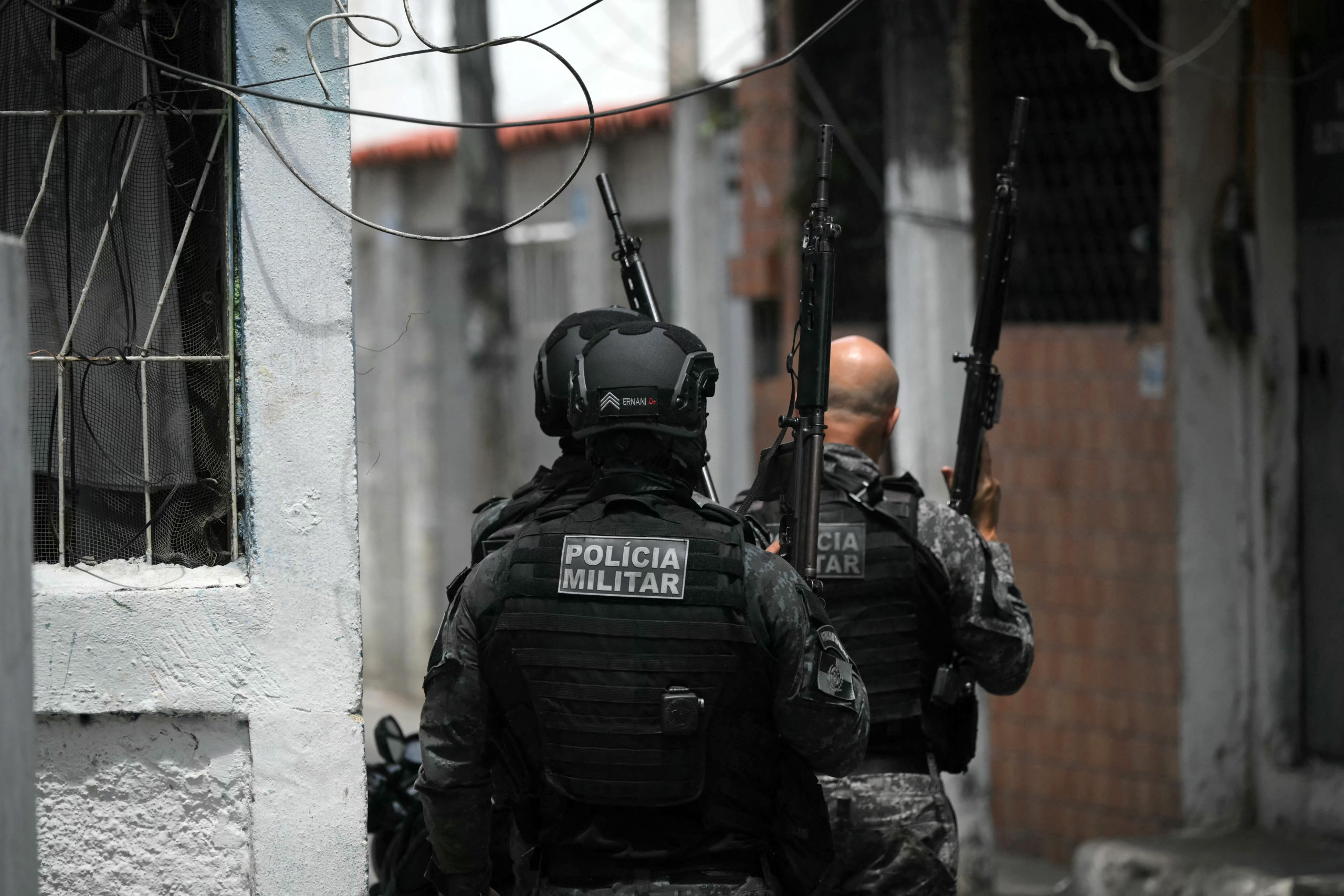“Death is not public policy”: organizations repudiate the most lethal police raid in RJ history
Public letter signed by 27 entities holds the Rio de Janeiro government accountable for adopting a war doctrine and requests the fulfillment of a Supreme Court decision on reducing police lethality
 Militariy police officers patrol during the Operacao Contencao (Operation Containment) at the Vila Cruzeiro favela, in the Penha complex, in Rio de Janeiro, Brazil, on October 28, 2025. At least 2,500 security forces agents took part in an operation to arrest drug traffickers from the Comando Vermelho (CV), which resulted in 18 suspects and several police officers dead. (Photo by Mauro PIMENTEL / AFP)
Militariy police officers patrol during the Operacao Contencao (Operation Containment) at the Vila Cruzeiro favela, in the Penha complex, in Rio de Janeiro, Brazil, on October 28, 2025. At least 2,500 security forces agents took part in an operation to arrest drug traffickers from the Comando Vermelho (CV), which resulted in 18 suspects and several police officers dead. (Photo by Mauro PIMENTEL / AFP)
A public letter signed by 27 human rights organizations, including Conectas, repudiates the Contenção raid, carried out this Tuesday (29) at the Alemão and Penha complexes, in the North region of Rio de Janeiro. The raid left over 60 dead and was classified as the most lethal operation in the state’s history.
The signatory entities denounce the illegitimate use of force by the State, the structural racism present in the security policy and the adoption of a war doctrine as a model of public management. According to the document, governor Cláudio Castro is responsible for four out of the five most lethal operations recorded in Rio — including the Vila Cruzeiro (2021) and the Jacarezinho (2022) massacres. “What the governor classifies as the largest raid in Rio de Janeiro history is, in fact, a slaughter perpetrated by the Brazilian state”, the organizations state.
The text criticizes the request from the state government to use army armored vehicles and to characterize the operation as a “state of defense”, which, according to the organizations, confirms the militarization of security policies and the consolidation of a logic of extermination against the Black and poor population in the favelas.
Read more
Violation of international standards
The letter mentions the Resource book on the use of force and firearms in law enforcement, published by the United Nations Office on Drugs and Crime (UNODC), and states that the Rio de Janeiro state government’s actions violate all international principles of lawfulness, necessity, proportionality, precaution, and accountability.
The organizations recall that Rio has already been convicted twice by the Inter-American Court on Human Rights, in the context of the Acari (1990) and Nova Brasília (1994 and 1995) massacres, and that the pattern of police violence continues to be reproduced. Data from the Public Security Institute indicates that, between 2014 and 2024, 5,421 youths up to the age of 29 were killed in police raids in the state.
Attack against the Favela ADPF
The entities also criticize attacks by the governor against ADPF 635, known as the ADPF of Favelas, which establishes parameters to reduce police lethality. By attempting to weaken the enforcement of the Federal Supreme Court decision, the government attempts to “delegitimize police oversight and the work of civil society in defending the right to life”.
The document further denounces the bravery bonus, set out in the new Organic Law on the Civil Police, which replaces the previous “Western bonus”. For the signatory organizations, awarding confrontation and death “stimulates the war mindset and turns communities into battlefields”.
Demands and accountability
Given the severity of the facts, the organizations demand that the government immediately relinquish the war-like mindset and that the Prosecution Office and the Judiciary branch investigate and hold accountable all officials — including the governor — for policies in violation of lawfulness and human rights.
The entities also ask for the revocation of bonuses that award police lethality and full compliance with the Supreme Court decision that determines the preparation and implementation of the State Plan to Reduce Police Lethality. “Public security must secure rights, not violate them. Residents of the favelas have the right to life, physical integrity and peace — and that is non-negotiable”, the document concludes.
The letter is signed by Amparar (Association of Friends and Relatives of Incarcerated Individuals and Youths Arrested at Fundação Casa), Amnesty International Brazil, Casa Fluminense, Center for Security and Citizenship Studies (CESeC), Center for Justice and International Law (CEJIL), CIDADES – the UERJ Urban Research Center, Conectas Direitos Humanos, FASE RJ (Federation of Social and Educational Assistance Bodies), Popular Public Security Forum of Rio de Janeiro, State Front for the End of Incarceration – RJ, GAJOP (Office of Legal Aid for Popular Organizations), the Tortura Nunca Mais group – RJ, Initiative for the Right to Memory and Racial Justice, Institute of Human Rights Defenders (DDH), Religion Studies Institute (ISER), Papo Reto Institute, Sou da Paz Institute, Instituto Terra, Trabalho e Cidadania (ITTC), Global Justice, Movimento Unidos dos Camelôs, Movements, NAJUP Luiza Mahin (Center for Popular University Legal Aid), Guerreiro Ramos Center for Studies and Research – NEGRA/UFF, Favela Observatory, Plataforma Justa, Network of Communities and Movements against Violence, Criminal Justice Network, RENAP RJ (National Network of Popular Attorneys), and Redes da Maré.






